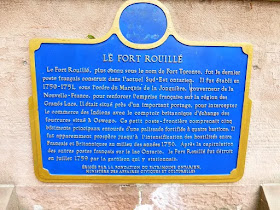
Location: City of
Toronto N 43° 37.843 W 079° 25.403
On the CNE grounds, near the bailey bridge across Lakeshore Blvd and the Bandshell.
On the CNE grounds, near the bailey bridge across Lakeshore Blvd and the Bandshell.
**Taken from the Ontario Historical Plaque:
The last French post built in present-day Southern Ontario, Fort Rouillé, more commonly known as Fort Toronto, was erected on this site in 1750-51. It was established by order of the Marquis de la Jonquière, Governor of New France, to help strengthen French control of the Great Lakes and was located here near an important portage to capture the trade of Indians travelling southeast toward the British fur-trading centre at Oswego. A small frontier post, Fort Rouillé was a palisaded fortification with four bastions and five main buildings. It apparently prospered until hostilities between the French and British increased in the mid-1750s. Following the capitulation of other French posts on Lake Ontario, Fort Rouillé was destroyed by its garrison in July 1759.

The memorial is a tall stone pillar, decorated with two Ontario Historical Plaques, one in French and one in English. A pair of cannons and a mortar rest next to the memorial. The dates on the cannons are one hundred years after the time of the French fort. A separate plaque explains the brief history and the layout of the fort, along with information regarding the archaeological discoveries made here.
A concrete sidewalk around the memorial follows the former walls of the fort.
The last French post built in present-day Southern Ontario, Fort Rouillé, more commonly known as Fort Toronto, was erected on this site in 1750-51. It was established by order of the Marquis de la Jonquière, Governor of New France, to help strengthen French control of the Great Lakes and was located here near an important portage to capture the trade of Indians travelling southeast toward the British fur-trading centre at Oswego. A small frontier post, Fort Rouillé was a palisaded fortification with four bastions and five main buildings. It apparently prospered until hostilities between the French and British increased in the mid-1750s. Following the capitulation of other French posts on Lake Ontario, Fort Rouillé was destroyed by its garrison in July 1759.

The memorial is a tall stone pillar, decorated with two Ontario Historical Plaques, one in French and one in English. A pair of cannons and a mortar rest next to the memorial. The dates on the cannons are one hundred years after the time of the French fort. A separate plaque explains the brief history and the layout of the fort, along with information regarding the archaeological discoveries made here.
A concrete sidewalk around the memorial follows the former walls of the fort.









No comments:
Post a Comment
Note: only a member of this blog may post a comment.